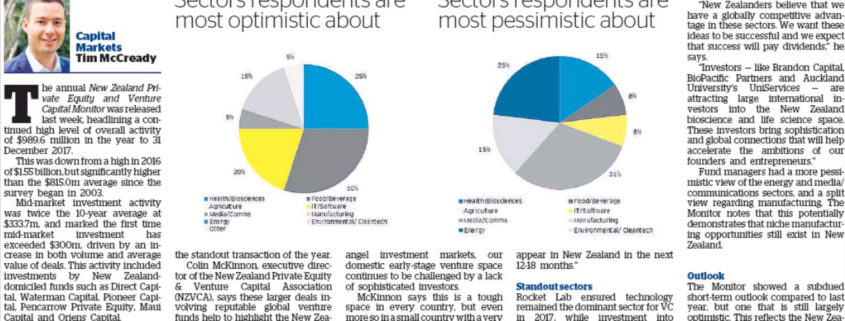Capital Markets: On the radar for investment (NZ Herald)
The annual New Zealand Private Equity and Venture Capital Monitor was released last week, headlining a continued high level of overall activity of $989.6 million in the year to 31 December 2017.
This was down from a high in 2016 of $1.55 billion, but significantly higher than the $815.0m average since the survey began in 2003.
Mid-market investment activity was twice the 10-year average at $333.7m, and marked the first time mid-market investment has exceeded $300m, driven by an increase in both volume and average value of deals. This activity included investments by New Zealand-domiciled funds such as Direct Capital, Waterman Capital, Pioneer Capital, Pencarrow Private Equity, Maui Capital and Oriens Capital.
The total value of disclosed venture capital and early-stage start-up deals in New Zealand for 2017 was a record $217.3m, spread across 48 deals, with higher levels of foreign capital. This compared to $92.3m spread over 50 deals in 2016.
The relatively small size of the market in New Zealand means that the figures captured in the survey can vary significantly from year to year due to large one-off investments. The significant jump in 2017 is largely down to Rocket Lab’s capital raise — the standout transaction of the year.
Colin McKinnon, executive director of the New Zealand Private Equity & Venture Capital Association (NZVCA), says these larger deals involving reputable global venture funds help to highlight the New Zealand innovation scene. Although the initial investment may often involve a serendipitous connection, Australasia is increasingly seen as a prospect for globally relevant innovation.
“The global venture community watch each other closely and New Zealand is on the radar,” he says.
“It doesn’t get much more exciting than launching rockets into space or building technology that is wanted by Apple.”
Though the report shows New Zealand has vibrant mid-market and angel investment markets, our domestic early-stage venture space continues to be challenged by a lack of sophisticated investors.
McKinnon says this is a tough space in every country, but even more so in a small country with a very small institutional investor base.
“The presence of international venture firms investing in New Zealand innovation is positive, but we still need more New Zealand-based venture funds to bridge the gap between angel funding and international venture investment,” he says.
“If we are to continue to see more international investment, we will need to see more domestic VC — maybe micro VC — in New Zealand. “This is happening. I would not be surprised to see a range of new funds appear in New Zealand in the next 12-18 months.”
Standout sectors
Rocket Lab ensured technology remained the dominant sector for VC in 2017, while investment into software and IT reduced. Other sectors obtaining venture capital funding during the year included the food/beverage and health/biosciences sectors.
This statistic was supported by survey respondents, asked to identify which sectors they were most optimistic and most pessimistic about. Both the food and beverage and health and biosciences sectors generated the most optimism.
McKinnon puts this down to innovation in these sectors solving big issues that impact on human survival.
“New Zealanders believe that we have a globally competitive advantage in these sectors. We want these ideas to be successful and we expect that success will pay dividends,” he says.
“Investors — like Brandon Capital, BioPacific Partners and Auckland University’s UniServices — are attracting large international investors into the New Zealand bioscience and life science space. These investors bring sophistication and global connections that will help accelerate the ambitions of our founders and entrepreneurs.”
Fund managers had a more pessimistic view of the energy and media/communications sectors, and a split view regarding manufacturing. The Monitor notes that this potentially demonstrates that niche manufacturing opportunities still exist in New Zealand.
Outlook
The Monitor showed a subdued short-term outlook compared to last year, but one that is still largely optimistic. This reflects the New Zealand economy’s relative resilience compared to globally markets.
McKinnon notes that this small dip likely had more to do with the timing of the survey, which was conducted in February at a time where there were several issues contributing to uncertainty, including the recent change of Government and increased international tensions.
The outlook for the next 18 months remains consistent with that of recent years, with geopolitical uncertainty an ongoing factor.




Leave a Reply
Want to join the discussion?Feel free to contribute!